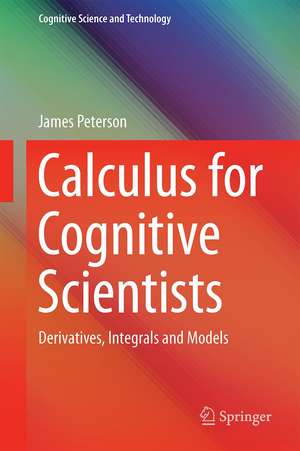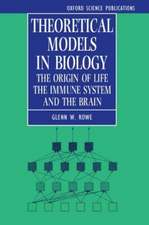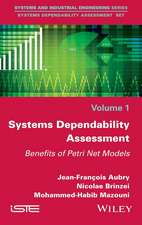Calculus for Cognitive Scientists: Derivatives, Integrals and Models: Cognitive Science and Technology
Autor James K. Petersonen Limba Engleză Hardback – 11 feb 2016
| Toate formatele și edițiile | Preț | Express |
|---|---|---|
| Paperback (2) | 999.02 lei 6-8 săpt. | |
| Springer Nature Singapore – 9 dec 2018 | 999.02 lei 6-8 săpt. | |
| Springer Nature Singapore – 9 dec 2018 | 1001.49 lei 6-8 săpt. | |
| Hardback (2) | 1005.46 lei 6-8 săpt. | |
| Springer Nature Singapore – 11 feb 2016 | 1005.46 lei 6-8 săpt. | |
| Springer Nature Singapore – 16 feb 2016 | 1008.11 lei 6-8 săpt. |
Din seria Cognitive Science and Technology
- 20%
 Preț: 903.48 lei
Preț: 903.48 lei - 20%
 Preț: 645.14 lei
Preț: 645.14 lei - 20%
 Preț: 958.20 lei
Preț: 958.20 lei - 20%
 Preț: 653.21 lei
Preț: 653.21 lei - 20%
 Preț: 1173.28 lei
Preț: 1173.28 lei - 20%
 Preț: 1008.95 lei
Preț: 1008.95 lei - 20%
 Preț: 1006.95 lei
Preț: 1006.95 lei - 20%
 Preț: 760.14 lei
Preț: 760.14 lei - 5%
 Preț: 1102.10 lei
Preț: 1102.10 lei - 20%
 Preț: 813.93 lei
Preț: 813.93 lei - 20%
 Preț: 586.86 lei
Preț: 586.86 lei - 20%
 Preț: 978.76 lei
Preț: 978.76 lei - 20%
 Preț: 811.45 lei
Preț: 811.45 lei - 20%
 Preț: 1634.78 lei
Preț: 1634.78 lei - 20%
 Preț: 773.59 lei
Preț: 773.59 lei - 20%
 Preț: 1914.38 lei
Preț: 1914.38 lei
Preț: 1005.46 lei
Preț vechi: 1256.83 lei
-20% Nou
Puncte Express: 1508
Preț estimativ în valută:
192.46€ • 209.12$ • 161.77£
192.46€ • 209.12$ • 161.77£
Carte tipărită la comandă
Livrare economică 21 aprilie-05 mai
Preluare comenzi: 021 569.72.76
Specificații
ISBN-13: 9789812878724
ISBN-10: 9812878726
Pagini: 500
Ilustrații: XXXI, 507 p. 105 illus. in color.
Dimensiuni: 155 x 235 x 36 mm
Greutate: 0.93 kg
Ediția:1st ed. 2016
Editura: Springer Nature Singapore
Colecția Springer
Seria Cognitive Science and Technology
Locul publicării:Singapore, Singapore
ISBN-10: 9812878726
Pagini: 500
Ilustrații: XXXI, 507 p. 105 illus. in color.
Dimensiuni: 155 x 235 x 36 mm
Greutate: 0.93 kg
Ediția:1st ed. 2016
Editura: Springer Nature Singapore
Colecția Springer
Seria Cognitive Science and Technology
Locul publicării:Singapore, Singapore
Public țintă
ResearchCuprins
Introductory Remarks.- Viability Selection.- Limits and Basic Smoothness.- Continuity and Derivatives.- Sin, Cos and All That.- Antiderivatives.- Substitutions.- Riemann Integration.- The Logarithm and Its Inverse.- Exponential and Logarithm Function Properties.- Simple Rate Equations.- Simple Protein Models.- Logistics Models.- Function Approximation.- Extreme Values.- Numerical Methods Order One ODEs.- Advanced Protein Models.- Matrices and Vectors.- A Cancer Model.- First Order Multivariable Calculus.- Second Order Multivariable Calculus.- Hamilton’s Rule In Evolutionary Biology.- Final Thoughts.- Background Reading.
Recenzii
“The introductory remarks in this book address the concern that many presentations of mathematics focus so heavily on traditional content that the usefulness of mathematics in other fields can be overlooked. … the approach is both demanding and thorough, but the brief exercise sets remain focused on providing opportunities for straightforward practice of the principles at hand. … Summing Up: Recommended. Lower- and upper-division undergraduates.” (N. W. Schillow, Choice, Vol. 54 (4), December, 2016)
Notă biografică
Dr. James Peterson is an Associate Professor in Mathematical Sciences and Biological Sciences at Clemson University, USA. His formal training is in mathematics but he has worked as an aerospace engineer and a software engineer also. He enjoys working on very hard problems that require multiple disciplines to make sense out of and he reads, studies and plays in cutting edge areas a lot as part of his interests.
Textul de pe ultima copertă
This book provides a self-study program on how mathematics, computer science and science can be usefully and seamlessly intertwined. Learning to use ideas from mathematics and computation is essential for understanding approaches to cognitive and biological science. As such the book covers calculus on one variable and two variables and works through a number of interesting first-order ODE models. It clearly uses MatLab in computational exercises where the models cannot be solved by hand, and also helps readers to understand that approximations cause errors – a fact that must always be kept in mind.
Caracteristici
Well-designed self-study program of in mathematics, cognitive and biological science, as well as computation Includes one and two variable calculus as well as first-order models with computer solution techniques Focuses on how to use mathematics and computation to gain insights into complicated problems Includes supplementary material: sn.pub/extras









